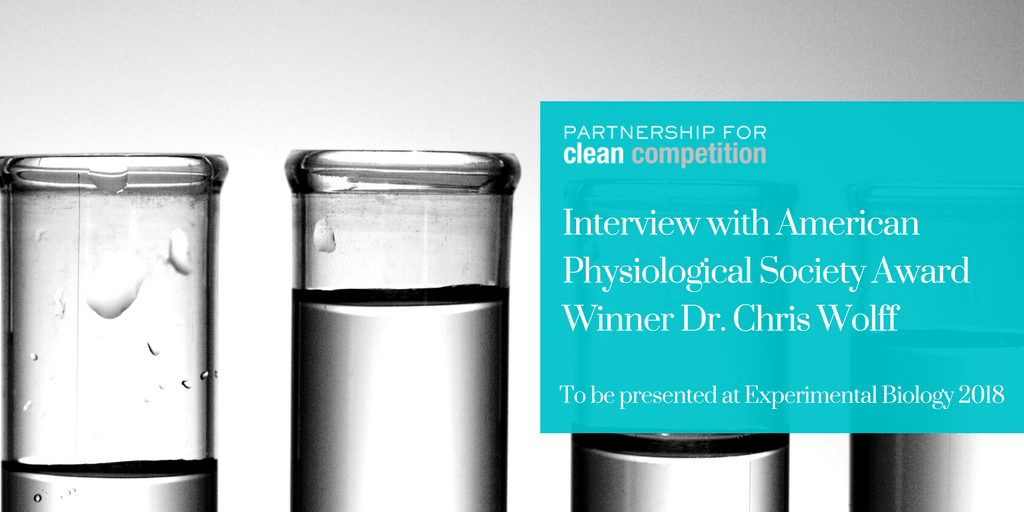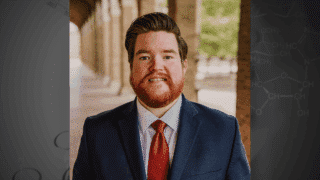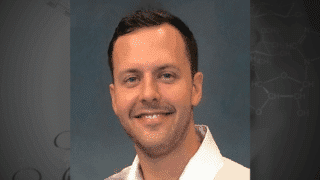The PCC is proud to support young scientific investigators around the world committed to high quality research and discovery. To this end, the PCC supports two American Physiological Society Awards annually: The PCC Postdoctoral Award, and the PCC Graduate Award. Both are presented at the annual Experimental Biology meeting to recognize outstanding research by young investigators.
This year’s Graduate Award will be presented to Dr. Chris Wolff, a doctoral student in the Translational Research on Aging and Chronic Disease laboratory at Colorado State University for his study “Healthspan-extending treatments enhance proteostasis through reduced cellular proliferation.”
Read on to find out why Chris believes his research on aging and skeletal muscle has the potential to improve the quality of life for everyone, as well as what he likes to do outside of the lab.
What question or challenge were you setting out to address when you chose your current field?
I, like most others, wanted to figure out ways to improve exercise performance (specifically endurance, in my case). Obviously, the research I’m interested in has changed as I’ve progressed through my training (and also because it is hard to get funding for those fun questions).
How would you explain your current research to a stranger on a bus?
Our research is primarily designed to identify physiological characteristics (phenotypes) that are commonly shared among “long-lived” models. We think that if we can figure out why various long-lived models age more successfully than normal animals, we can help implement interventions to slow the aging process in more people.
What’s the most interesting thing you’ve learned this week?
This week I got to submit my dissertation. So you could say this is the week I actually became a doctor. That, in my opinion, is pretty cool.
I also found a slightly older paper that explained a drug we used in my dissertation (rapamycin) that is supposed to block protein synthesis also has a significant effect of reducing protein breakdown by inhibiting the ubiquitin proteasome system. This is an off- target effect that seems to have had relatively exciting impact in cancer treatment.
What do you think will be the next big discovery or development in your field?
If we go broadly, the NIH funded a HUGE study called MoTrPAc, to study the “molecular transducers of physical activity”. They tasked some of the best scientists in the field to help the world understand WHY physical activity and exercise have such potent effects on whole body health. The data from those experiments may finally help push exercise into the realm of a true prescription, which to me, is very exciting.
Less globally, I think the field of aging biology is getting much closer to finding interventions that can actually improve human health span.
Share a turning point or defining moment in your work as a scientist.
To nerd out a little bit, the most exciting moment for me was when we received notification from the sequencing core we collaborate with saying that our experiment was successful. When we got that email, I knew we would be busy, but it also let me know that the last five years of work in the lab had finally paid off. We’ve got about 50 billion data points to analyze now, so it may take a while to complete the turn.
Why is your area of scientific discovery important for the ordinary citizen?
Our work is designed to help understand the biological processes that contribute to aging and age-related diseases. Heart disease, diabetes, and Alzheimer’s all share “aging” as a common risk factor. This is important because EVERYONE ages. We always make the caveat that we’re not trying to make everyone live to 120 years, we just want them to be healthy until they die. We morbidly joke that the best way to “go” is falling off the mountain when we’re in our 90s. But if you think about it, right now, most people have at least one chronic disease by the time they’ve retired. After working all their lives, they can’t enjoy retirement as much. The rest of their lives are spent with at least one and most time two chronic diseases, decreasing their quality of life.
What’s the coolest thing about your work?
If you mean academic science generally, then it’s the constant shifting of priorities. We get to progress through the scientific method in a rotating approach. We’re in the lab doing experiments, then analyzing data, then publishing our work, then doing the next experiment the data we analyzed told us we should do, etc.
If you mean the outcome of the science, I think that the potential to improve the health of older individuals is the most exciting part.
Do you believe your research could carry over into/complement the anti-doping field?
Anti-doping is such a complex field. Mix that with the complex physiology, especially of elite athletes, and it gets even more dynamic. From what I have learned thus far, there are applications of GC-MS (and more precise machines) that can provide insight into potential mechanisms of doping.
Although unrealistic, and certainly very expensive, it COULD be helpful to implement some of the larger scale work (proteomics, metabolomics, sequencing) to identify potential treatments that have inappropriately altered an athlete’s physiology. The one major problem, is that people respond to treatments or interventions differently. However, I think that with the biological passport programs, if we were to implement specific tests with the amount of precision that our methods (and others) provide, we could start to identify potential effects of doping over time.
Do you have any advice for young people interested in science today?
Yes. Even though there are constantly negative publications about there being too many PhD trained scientists, the need for individuals who are capable of thinking critically to solve problems will never diminish. Especially with respect to clean competition, brilliant thinkers are needed to find ways to identify the individuals who are trying to circumvent the system and gain an advantage. Improved understanding of physiology and the methods to assess physiology must continue to grow, at arguably a faster rate than those who are skirting the system
What do you like to do when you aren’t working on research?
I enjoy hiking in the mountains of Colorado, although I’m moving to Florida in a few months. I also love running, and my other hobbies are reading and playing the tuba. I used to be much better at running and playing tuba, but I had to take a break to read and write so I could finally finish my dissertation.
We congratulate Chris on his dissertation, research, and PCC Award win! The award will be presented at Experimental Biology in San Diego on April 25th during a special APS session. To learn more about the Translational Research on Aging and Chronic Disease laboratory, click here.
Read about the PCC Post-Doctoral Award Recipient, Dr. Katrin Dias.




